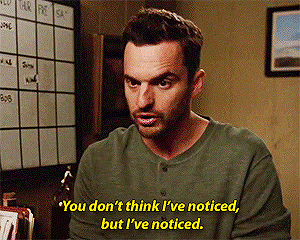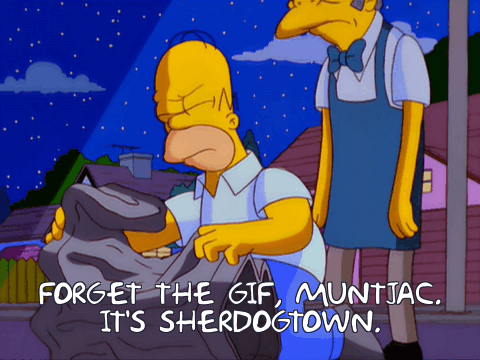Finally got around to this double-header. In terms of writing up reviews, I'm not going to get into anything too extensive for two reasons: First, I didn't like either movie enough to justify digging into them (which isn't to say that I didn't enjoy them), and second, I don't think they're deep enough to be dug into anyway (which isn't to say that they don't have interesting things going on).
That said, rather than write shit out here, I'm going to be reactive for this discussion and work my way through most of your guys' posts instead. I will, however, start off by going through some of my own general/random thoughts.
Over the Edge: For general thoughts, the look, the feel, and the time of this movie instantly made me think of
Billy Jack. Are you a fan of that film,
Cubo? Nowhere near as good, or as cool, or as coherent, but definitely in the same 70s "movie family" as
Billy Jack, with the isolated kids disconnected from their parents and from the town taking refuge at an off-site spot but failing to escape trouble as it nips at their heels at every turn. Having been born in 1989, the time and the events of the film were way before my time. This is more a film for/about my parents than me. But it was still interesting to see the way they worked through the familiar coming of age themes in that particular context with respect to the juvenile delinquency problem. In fact, with respect to juvenile delinquency, this film displayed quite a kinship with the 50s juvenile delinquency films like
The Wild One,
Blackboard Jungle, and
Rebel Without a Cause.
For random thoughts: Holy shit, the dad is Andy Romano (aka Admiral Bates in
Under Siege and the Undersecretary of Defense in
Eraser).
Extra holy shit, Doberman is the soldier who loses his shit in
Mean Streets.
On the whole, it was exactly what I was expecting. I wasn't blown away, as it was no masterpiece, nor was I disappointed, as I wasn't expecting one. To me, it was a cinematic time capsule; it was interesting to the extent that it provided a glimpse into that era.
Convoy: For general thoughts, this was much better than I remembered it being. When I first watched it, I was watching
Straw Dogs and
The Getaway like a fiend and I think I was just bummed that it was nothing like either of those two and wasn't trying to be. But rewatching it, it's actually a pretty damn good movie. Unlike some of you, I wasn't at all into it for the first third and was thinking that maybe my memory wasn't so fuzzy about this movie being a turd, but then, once the convoy got going and once the social commentary stuff kicked in, I realized that it's not a bad little movie. Not top shelf Peckinpah, for sure, and it had its share of problems (Kris Kristofferson, for one thing; Ali MacGraw's hair, for another), but if you didn't enjoy this movie, then you missed out.
For random thoughts: We got to talking in the Bruce Lee poll thread about fights where they totally destroy the place. Well, that trucker versus cops fight sure as shit qualifies. And seriously, who's the slimy little communist shit twinkle-toed cocksucker who had the idea to turn the beautiful Ali MacGraw into Cory Matthews?

Over the Edge is one of those movies about the snowball effect, and in this film, the snowball really has rolled so far and grown so large that there is no stopping it even when the film begins. That's overwhelmingly what I like most about this movie. It's not like the uprising is orchestrated or anything. It's just a situation spiraling out of control, bad decisions piling up one after the other until there is no turning back. For example: The sheriff is an inept asshole -- but he isn't some evil villain who wants to kill anyone, only doing so when an unloaded gun is pointed at him. And it's not like Carl wanted to see the Sheriff dead, it was just some other kids acting on their own.
Nothing that I felt about this movie was felt
overwhelmingly, but that aside, I'm on board with this.
So a bunch of inept parents with no idea how to raise kids congregate in one newbuilt city. They're economically secure but really have no idea about how to deal with young teens.
While watching
Over the Edge, my thoughts drifted more than once to
The Village. At first, that might seem like a preposterous juxtaposition, but honestly, those two films have a lot of similarities in terms of parents dealing with kids and trying to create a utopia without any idea WTF they're doing. Except that, in
The Village, you could make the argument that it "works out," whereas
Over the Edge ends in catastrophic failure (how else are 70s movies supposed to end

).
That really arrives at this movies biggest flaw: the kids. It's just so fucking laughable that these whitebread youngsters are supposed to come off as uber-hardened criminals.
I never got an "uber-hardened criminals" vibe. I just got a "bored little knucklehead shits" vibe.
But really, I think that was supposed to be the entire selling-point of the film, seeing young, mostly clean-cut looking suburbanites acting "bad". I mentioned this back when we watched Tuff Turf (week 85), why is it in American movies that when they want to show hardened, street-smart "badass-kids" they still show them living prim and proper in sumptuous homes? The contrast just makes everything so tacky and garish.
I'd say that
the contrast is the point. That is, the point that I got was that there's no reason for these kids to be "bad," however you want to define that concept, and that the only reason that they were
turning bad was because of that ridiculous pressure-cooker environment. You're making it seem like the point with the depiction of the kids in
Over the Edge was meant to be on par with the depiction of the kids in
Dangerous Minds, but I don't think that's accurate.
Honestly, this movie came off as a big propaganda scare piece to me. “Hey, parents. Do you want to keep your kids away from criminal mischief? Then build them a bowling alley. There’s no way they’ll migrate their deviancy there. We’re sure of it. Or else your children will become devils.”
I felt that a lot, too. Very much of a piece with the 50s juvenile delinquency cycle, only with the 70s brand of didacticism.
I got the message of the movie that if you don’t listen to and be involved in your children’s lives, then they’ll become drug-addicted criminals that wreck the town, but this message wasn’t handled with much grace.
The answer to this question doesn't invalidate this entirely valid criticism, but, out of curiosity: Did you expect there to be an abundance of grace in a movie like this?
For a film taking a stand about mistreatment from authority, it really offers no solutions.
Why does it need to? Maybe there aren't any. Sometimes people just observe shit.
This issue places the film squarely in the nihilistic 70s tradition. There's no solution at the end of
Taxi Driver.
...And Justice for All just fucking stops, you can't really say that the movie even
has an ending. There was a 70s brand of didacticism, as I mentioned above, but more often than not, in 70s movies, nihilism is at the thematic wheel.
Btw, I know I poked fun at this film for the way cars exploded, but the original Walking Tall might hold the title for most ridiculous car explosion meant to be in a serious manner.
It just blows up in mid-air. I die every time I see it.<45>
Best spoof of that trope:
Maybe the end ain't so fun when reality creeps back in after shit gets out of control, someone dies, and kids are sent to spend a little time with the state. But to me what wins out is his friends on the bridge letting him know he's not alone. That's a happy ending in my book and a positive message to boot. This movie is about the importance of friendship in a way. When you're a kid this nothing more important than your buddies.
Hmm. I didn't get a "happy ending" vibe. I wouldn't bridle at the word "triumphant" being applied, but "happy" is a stretch. What you're describing is better suited to
Stand by Me or
The Sandlot.
Over the Edge was more in the
Billy Jack vein with a show of solidarity despite the shittiness of the situation. It pulls back from full-on nihilism, it doesn't hang its head, it's not morose or defeatist, but at the same time, I didn't leave it with an urge to merrily skip down a rainbow road.
And before you ask: Yes, I often feel the urge to merrily skip down a rainbow road.
I believe it is true that in their case Oooo Child things are gonna get easier someday when the world is much brighter..... is QFMFT
I think I had some expectations for Burt Young, but this was sort of the beginning of a string of movies not in the Rocky series where he suddenly stopped delivering memorable and interesting supporting characters.
I'm not going to pretend that Burt Young is some unsung genius, but I want to make sure that you're not including in this string his stellar supporting work in
Once Upon a Time in America and
The Pope of Greenwich Village. In the former, though the movie is four hours of gold, he's memorable for the "Cock Insurance" story:
What did you take from Lyle laughing?
His exasperation that Duck was still alive. It’s one of those moments when you’re so angry at something, but you can’t help but laugh at the situation. It was there for comedic effect though.
I thought the laugh was him letting go of his anger.
FWIW, I'm 100% with
Cubo on this. After all the shit, he's just so exasperated, he just can't fucking believe it, he doesn't even need to "let his anger go": It just
goes. It's gone. There's nothing left to do but laugh. It's like John Huston busting up at the end of
The Treasure of the Sierra Madre. There's nothing left to say, there's nothing left to do. You've just got to laugh.
I was also annoyed that Dick didn’t let Ali out when she wanted off the truck
First, I like the Freudian slip there from "Duck" to "Dick." Second, it's not that he didn't let her out, it's that she didn't want to get out bad enough to be willing to jump out.
*Insert
Seinfeld clip of George's "tuck and roll" idea in "The Limo"*
I think with Convoy Peckinpah wanted to make another positive movie like Ballad of Cable Hogue (which was his personal favourite), but was too coked up to get it done properly. Really sad, because BoCH is one of my absolute favourites too. I love it how it plays with one’s pessimistic expectations at times, but turns things on their head in positive note. The balladlike storyline reminds of Convoy’s country song momentum.
Even though I think Wild Bunch is a masterpiece, it’s also a good example of how relatively easy it is to do a compelling movie that plays with negativity and Convoy on the other hand is an example of how hard it is to try to create something with positive note without being lame or obvious. Convoy avoids those pitfalls, but also towards the end fails to get the good vibes delivered.
What you're talking about here is why
Straw Dogs and
The Getaway are my favorites of his. Those two movies aren't just dark, they aren't just violent, they're fucking
mean, they're nasty, vicious movies with evil and despicable people in them...and yet they both end happily and beautifully. For me, that's Peckinpah shining at his brightest, when he has both poles of darkness and light working at max capacity in the same film and succeeding in the end at illuminating the darkness.
From the trivia out there it sounds like the bulk of Sam's social commentary got cut when
someone else was brought in to chop his final version down from 220 minutes to 110. 
Jesus Christ, he got the Orson Welles treatment. That's a whole lot of fucking movie on the cutting room floor.
The early scene between Kris Kristofferson and the waitress/girlfriend was super weird. The girl looked like she was crying the entire time, and she was so uncomfortable.
This, this, and more this. Definitely a weird scene that had me going "WTF?" all the way through.
I've always taken issue with films about a group of kids doing something they shouldn't be doing. I'm not talking like loitering and hanging around the rec center, I'm talking about pulling guns on cops and trashing places. From a legal standpoint, who cares whether the gun was loaded, the cop couldn't have reasonably known. A kid on drugs stole a car and ran from the cops, crashed his car, ran away and after the cop asked him to stop, the kid pulled a handgun on him. It's tragic and unfortunate, but what was Matt Dillon thinking? And no, I am drawing zero historical or political parallels with this, either.
[...]
Final thoughts - the kids brought what happened to them on themselves. They're old enough to understand the risks and dangers of what they're doing. Some of them were young high schoolers, but they got violent fast. Shotguns, explosives, and mayhem. Are we supposed to root for them? I sure didn't. And then one shot the cop while driving in the head. That's a riot.
I'm with you on all of this. Wrong is wrong. Nobody came out looking too good, but nobody gets to be on any moral high horses, either.










